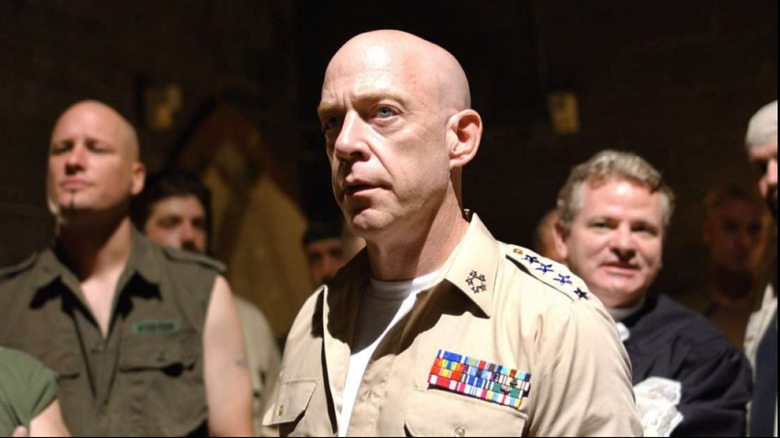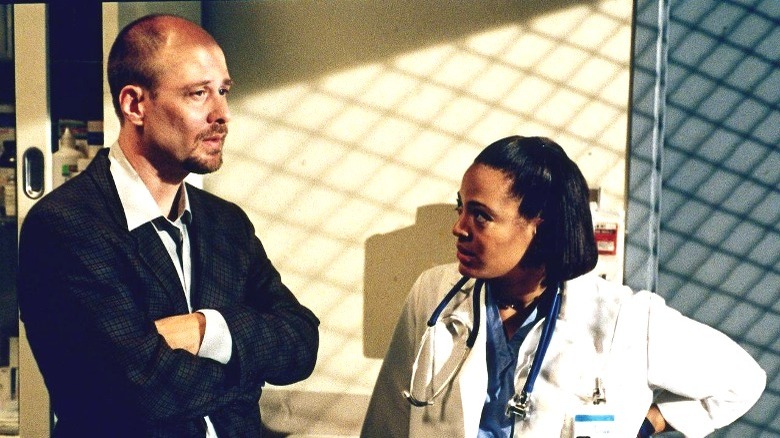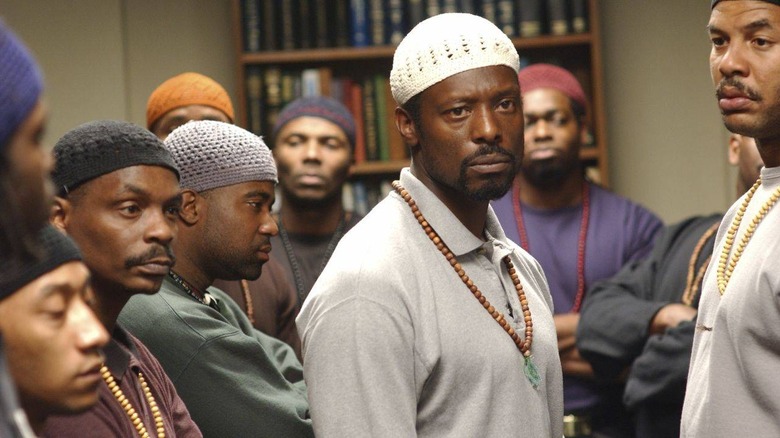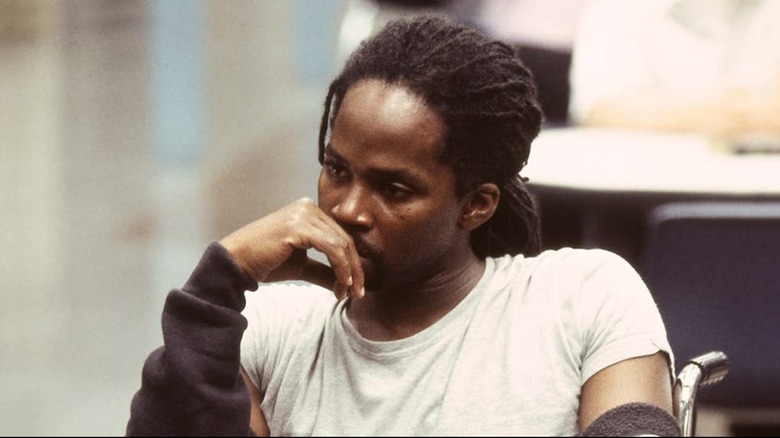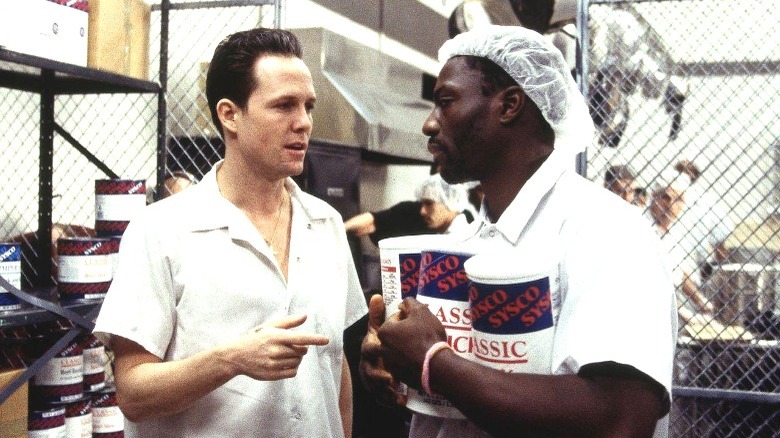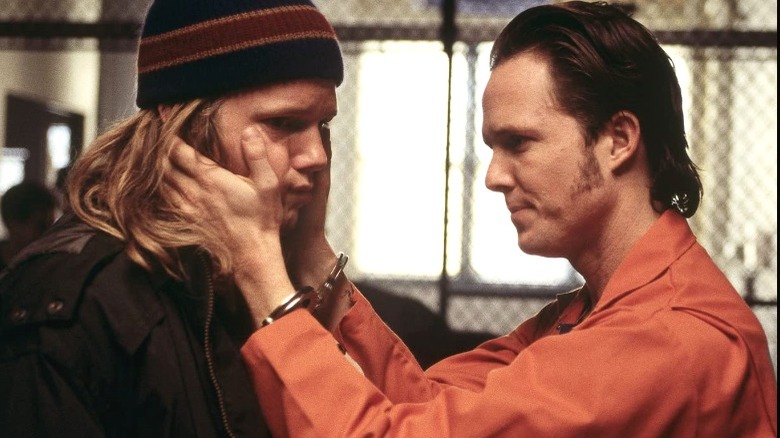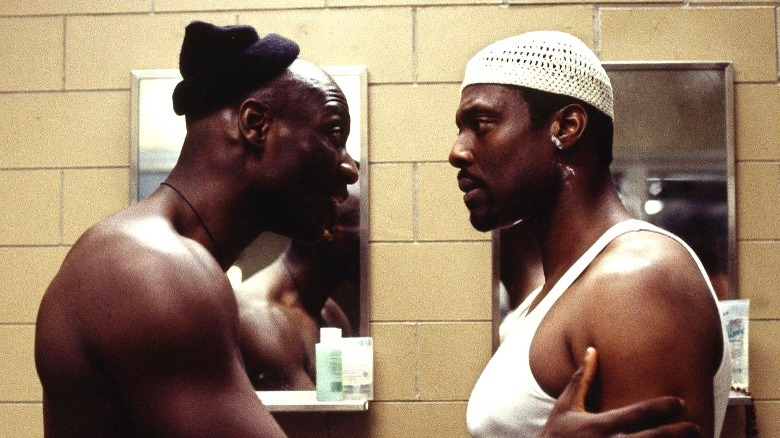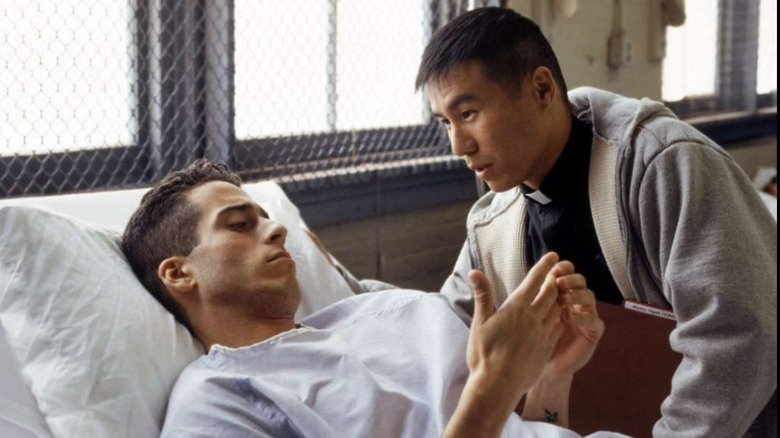Every Season Of Oz Ranked Worst To Best
Rightfully considered cultural touchstones, "The Sopranos" and "The Wire" began a new era in television that continues on to this day. Arguably though, given how large those shows loom in the zeitgeist, "Oz" lost its significance in television history somewhere along the way. However, without this prison soap opera, those seminal shows don't find their footing.
From 1997 to 2003, HBO's "Oz" told the story of Oswald State Correctional Facility, a fictional maximum security prison located in New York. The penitentiary, nicknamed Oz, includes an experimental unit, Emerald City, that seeks to rehabilitate its inmates rather than punish them. A major source of tension within Em City derives from the religious and racial factions that naturally form in the unit with Latinos, African-Americans, Italians, Muslims, and members of the Aryan Nation living together in close quarters. Across six seasons, the series presents a horrific look at prison life with acts of ultra-violence, rape, and drug use shown without abandon.
While the series often leaves behind its gritty prison drama premise in favor of full-blown soap opera, "Oz" finds its unique voice early on and owns it. The surrealist approach of series creator Tom Fontana, and the visceral manner in which the episodes play out, effectively offers up commentary on the state of America and the country's prison system (at the time). More importantly, it unlocked the potential of premium cable television. Looking back on the show that started it all, we rank every season of "Oz" from worst to best.
7. Season 4, Part 2
For better and for worse, the zaniness of "Oz" remains a hallmark, but with limitations of course. In this case, the second half of Season 4 finds that breaking point. Unlike other seasons, HBO decided to split Season 4 into two parts (each eight episodes long) and broadcast them six months apart, resulting in technically the longest season of the show. Although Part 1 provides some of the best moments "Oz" has to offer (more on that later), amusingly, Part 2 gave us the worst storyline.
In "Revenge is Sweet," Dr. Gloria Nathan (Lauren Vélez) administers an experimental drug in an effort to manage overcrowding. The pill given speeds up the aging process so that prisoners will become the age that they would be at the end of their sentence, enabling them to be released sooner; a bizarre and nonsensical turn that becomes the show's official jump-the-shark moment. Over and above that, though, this plot sticks out like a sore thumb in contrast to everything else that happens in Em City. And sure, no one tunes in to "Oz" for a realistic portrayal of prison life, but audiences love the show for a reason — and taking such a genre curve threatens their loyalty (and patience).
6. Season 6
Dashing any hope of "Oz" rekindling its absurdist brilliance in time for a sendoff, the final season instead found itself simply absurd. By the time the sixth and final season came around, the show killed off the most interesting characters and the handful of inmates left that audiences still care about have run their course. Apart from a mild curiosity as to what happens to Em City's guards and remaining prisoners, little investment remains in the narrative as a whole. Although "Oz" treats its fans to some satisfying resolutions when favorites take their revenge and karma finds common enemies, the season's execution can only be described as ridiculous for ridiculousness's sake. (A "Macbeth" reenactment, really?)
Unfortunately, for all its influence on pop culture, "Oz" ends in a whimper rather than a deserved bang. But regardless of how disappointing the good-bye, the show endures as a point of reference for modern entertainment — there's television before "Oz" and television after.
5. Season 5
The dubious honor of following up the half-baked second part of Season 4, which ended with a gas explosion inside the penitentiary, goes to Season 5. For the most part, the season continues its trend of wacky nonsense. Cyril's (Scott William Winters) placement on death row in spite of his mental disability has its moments, but fundamentally, the situation feels implausible (even within the walls of Oz). Not to be outdone, Luke Perry's Jeremiah Cloutier, who presumably died in the explosion but somehow miraculously survived, pulls a disappearing act and suspiciously goes missing, never to be found again.
A bright spot in the season, "Variety" shines with its unique solution to filling the void of Augustus Hill's (Harold Perrineau) absence in the episode. Rather than use voice-over or have someone else narrate, characters break the fourth wall and collectively narrate the episode through song. It sounds like a hamfisted way of filling in for Perrineau, but it somehow works with the show's surrealism. The episode serves as a reminder of Tom Fontana's ability to manage and contain the silliness, something he fails to do more often than not in the latter seasons.
4. Season 3
Not particularly bad but not exactly good, Season 3's middling efforts marks the show's official halfway point, and Beecher's (Lee Tergesen) season storyline acts as a prime example of this season's adequacy. Em City's medical staff release Beecher from the infirmary after Keller (Chris Meloni) and an Aryan guard, Metzger (Bill Fagerbakke), broke his arms and legs in the previous season. His quest for vengeance against Keller, Metzger, and the head of the Aryan Brotherhood, Schillinger (J.K. Simmons), culminates in his involvement in the death of a young inmate and him seeking the spiritual guidance of Muslim leader Kareem Saïd (Eamonn Walker). It's a compelling arc betrayed only by a truly bewildering sequence in "The Truth and Nothing But ..." where Beecher uses his sharpened fingernails to claw and slash (and eventually kill) his way to revenge.
Season 3 sees the addition of some noteworthy characters like Officer Claire Howell (Kristin Rohde), Office Clayton Hughes (Seth Gilliam), and Nikolai Stanislofsky (Philip Casnoff), all of whom deliver compelling performances throughout the series. While some campy aspects foreshadow the next three seasons, the eight episodes encapsulate interesting writing and storytelling with some fantastic turns from the ensemble across the board.
3. Season 2
In its sophomore season, "Oz" doubles down on its gritty, violent, and graphic tone. Season 2 deals with the aftermath of the riot in Season 1's finale and takes the show down some dark and twisted paths. To counter that darkness, a surprisingly emotional arc between the unhinged O'Reily (Dean Winters) and Dr. Nathan (Lauren Vélez) transpires that ultimately turns incredibly sinister. Following O'Reily's breast cancer diagnosis, he undergoes surgery and chemotherapy, resulting in himself and Dr. Nathan spending more time together than normal — and the inmate falling in love with the prison doctor.
Elevated by great performances from Winters and Vélez, the development, and demise, of O'Reily and Dr. Nathan's "relationship" exemplifies the layered and nuanced writing of the early seasons. Winters and the "Oz" writers elicit genuine sympathy from audiences for O'Reily in particular, as his vulnerability stands out while he deals with his illness. However, just as quickly, the show snaps back into form as O'Reily's true nature comes back into focus. A truly phenomenal show when firing on all cylinders, Season 2 demonstrates the lasting legacy of "Oz."
2. Season 4, Part 1
Although the super-sized Season 4 gave rise to the series' lowest point, Part 1 of the season persists as an extraordinary piece of work that strongly rivals the program's debut. Tom Fontana returns to form with his perversity for cruelty — best seen in the introduction of Guillaume Tarrant (Lothaire Bluteau), a man sentenced to Oz for destroying a statue in a museum. A rather innocuous crime, especially given what his prison mates are in for, and yet, the judicial system throws Tarrant to the wolves in a rather vicious fashion.
Fontana also includes a running story arc with newcomer Martin Querns (Reg E. Cathey) as McManus' (Terry Kinney) replacement as Em City's manager, taking audiences behind the curtain of the penitentiary's operations. Season 4's most engaging storyline — and arguably the two best performances of the series — occurs when Adebisi (Adewale Akinnuoye-Agbaje) and Saïd (Eamonn Walker) come to loggerheads over Adebisi's newfound authority under Querns. The mounting tension throughout the season builds to a thrilling showdown between the two powerhouses in Part 1's finale. Had the series ended here, "Oz" could have solidified itself as a bona fide TV classic without blemish.
1. Season 1
"Oz" begins through the doe eyes of Beecher (Lee Tergesen), a former lawyer sentenced to 15 years in Oz for killing a 9-year-old girl while driving drunk. The prison assigns Beecher, who initially appears timid and meek, to bunk with Adebisi (Adewale Akinnuoye-Agbaje), an intimidating roommate in both physicality and presence. Schillinger (J.K. Simmons) "saves" Beecher from this tense situation, only to be revealed as a member of the Aryan Brotherhood soon after. Over the course of eight episodes, Beecher goes from being branded and raped to defecating on his attacker. Suffice to say, a lot happens in the first season, concluding in a mad finale when a riot breaks loose in Em City.
Difficult to top, the debut season of "Oz" presented a healthy challenge for every subsequent season (with Season 4, Part 1 as truly the lone competitor). At the time, the series felt fresh and new, pushing the boundaries of storytelling that blurred the lines between film and television. With audiences spoiled for choice, a show like "Oz" might be easily taken for granted today, but what Tom Fontana and HBO pioneered set in motion a tidal wave of shows that eventually changed the industry and audiences alike. And it all started with eight episodes of television that found the perfect balance between outrageous, sadistic, thrilling, grotesque, and at times, even comical.
